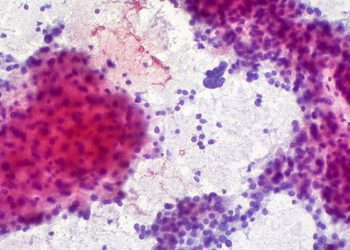Immunotherapy shows efficacy for pediatric allergic asthma and rhinitis
Image: PD
1. Subcutaneous immunotherapy (SCIT) and sublingual immunotherapy (SLIT) both show efficacy in treatment of pediatric allergic asthma and rhinitis.
2. While SCIT is FDA-approved, SLIT is currently used off-label in the United States. SLIT is approved and used in European countries.
Evidence Rating Level: 1 (Excellent)
Study Rundown: Allergen-specific immunotherapy is important for asthma or allergic rhinitis symptoms that cannot be adequately controlled through medication and allergen avoidance alone. SCIT is FDA approved in the United States, while SLIT is currently used off label, though it is approved in European countries. This systematic review examined 34 randomized control trials and found that both SLIT and SCIT have efficacy in treating asthma and allergic rhinitis. Safety data were limited, but mostly showed local erythema at the SCIT injection site or oral irritation for SLIT. Other limitations included variability among studies in terms of medication dosages and duration, as well as reporting of outcomes and safety data. Additionally, most SCIT studies included single allergens, while SLIT studies commonly had multiple allergens. SLIT is considered favorable to SCIT since it is conveniently administered at home, as opposed to clinic visits being required for SCIT injections. Further studies directly comparing SCIT to SLIT with better evaluation of safety profiles and long-term impacts are suggested.
Click to read the study published today in Pediatrics
Relevant Reading: Comparison of allergen immunotherapy practice patients in the United States and Europe.
Study Author, Julia Kim, MD, MPH, talks to 2 Minute Medicine: Johns Hopkins University School of Medicine, Department of Pediatrics, Division of General Pediatrics and Adolescent Medicine.
“We found good efficacy for both allergy shots and sublingual drops for controlling symptoms of allergic rhinitis and asthma in children. This is promising news for the possible use of sublingual treatment in children in the U.S., since it is convenient, easy to give to children, does not require injections, and can be given at home. We believe that more studies are needed to evaluate the safety of sublingual immunotherapy for children with asthma and allergic rhinitis, in comparison to standard allergy shots.”
In-Depth [systematic review]: This systematic review analyzed 34 randomized control trials to evaluate the efficacy of SCIT and SLIT in treating asthma and allergic rhinitis. Two independent reviewers adapted a strength of evidence grading scale from the Guide for Conducting Comparativeness Effectiveness Reviews. Based on thirteen trials (920 children), SCIT was found to have moderate strength of evidence for improving asthma and allergic rhinitis symptoms, but low strength of evidence for improving conjunctivitis or asthma medication scores, compared to usual care. Eighteen studies (1583 children) contrasted SLIT to usual care, establishing a high level of evidence for improvement in asthma symptoms. It had only a moderate level of evidence for improvement of rhinitis and conjunctivitis symptoms and decreasing medication usage. The last three studies in the review (135 children) directly compared SLIT to SCIT. These found low evidence to support SCIT over SLIT. Safety data were limited, but localized discomfort was common with both SCIT and SLIT.
By Neha Joshi and Devika Bhushan
More from this author: New pediatric GERD management guidelines released, Quality improvement methods increase adherence to pediatric pneumonia treatment guidelines, Children still hospitalized and treated for ITP despite conservative guidelines, Parent behavior training treats preschoolers at risk for ADHD, AAP supports same-sex marriage and parenting, Low birth weight children show neurobehavioral impairments, Study explores daily iron supplementation in 2- to 5-year-olds, New guidelines for pediatric acute otitis media released
© 2013 2minutemedicine.com. All rights reserved. No works may be reproduced without written consent from 2minutemedicine.com. Disclaimer: We present factual information directly from peer reviewed medical journals. No post should be construed as medical advice and is not intended as such by the authors or by 2minutemedicine.com. PLEASE SEE A HEALTHCARE PROVIDER IN YOUR AREA IF YOU SEEK MEDICAL ADVICE OF ANY SORT. Content is produced in accordance with fair use copyrights solely and strictly for the purpose of teaching, news and criticism. No benefit, monetary or otherwise, is realized by any participants or the owner of this domain.


![2 Minute Medicine: Pharma Roundup: Price Hikes, Breakthrough Approvals, Legal Showdowns, Biotech Expansion, and Europe’s Pricing Debate [May 12nd, 2025]](https://www.2minutemedicine.com/wp-content/uploads/2025/05/ChatGPT-Image-May-12-2025-at-10_22_23-AM-350x250.png)




![Pointed techniques: an experience of acupuncture and western medicine [Perspective]](https://www.2minutemedicine.com/wp-content/uploads/2013/05/Hua_t08-75x75.jpg)